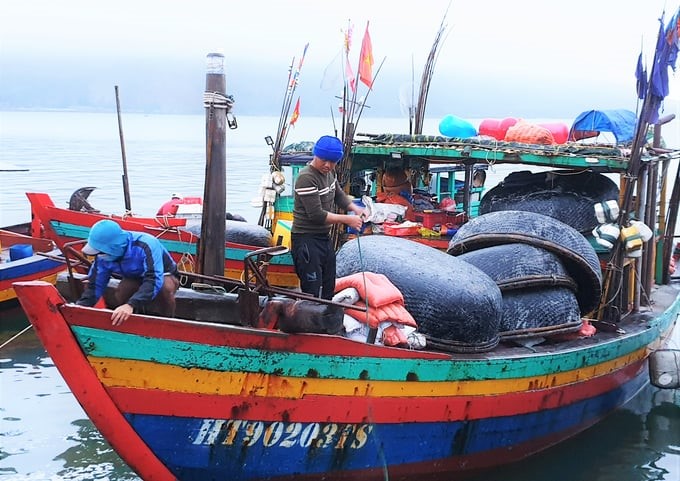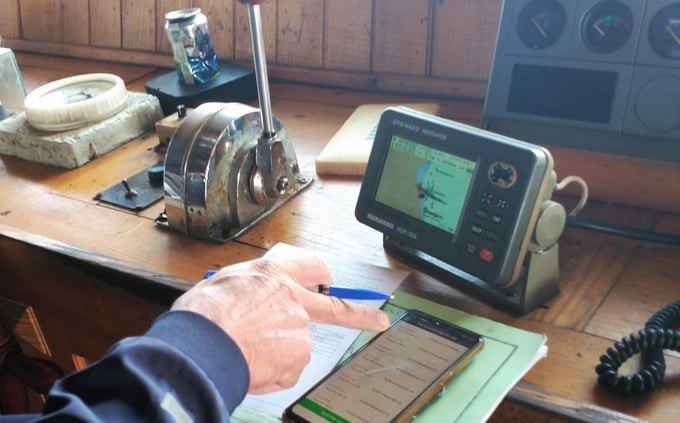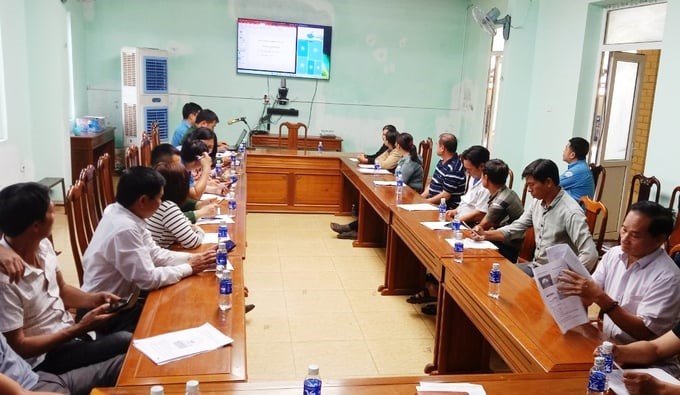June 19, 2025 | 03:21 GMT +7
June 19, 2025 | 03:21 GMT +7
Hotline: 0913.378.918
June 19, 2025 | 03:21 GMT +7
Hotline: 0913.378.918

Ha Tinh functional forces are determined to prevent violations of IUU fishing early and remotely. Photo: Thanh Nga.
According to statistics, as of now, Ha Tinh province has 2,668 fishing vessels that have been registered into the Vietnam National Vessels Registration Book, reaching 100%. Of which, 2,207 fishing vessels have a length of 6 to under 12 meters; 372 vessels have a length of 12 to under 15 meters; and 89 vessels have the largest length of 15 meters or more.
Although the small fleet accounts for the majority, the inspection and supervision work faces many difficulties because the "free fishing" mindset of fishermen is somewhat ingrained. Therefore, in the latest guidance document of the Ha Tinh Provincial IUU Steering Committee, it is required that forces, units, and localities continue to coordinate closely with each other, disseminate, and mobilize in many forms and to many objects to further enhance people's awareness of law observance. In particular, focus on key areas to thoroughly apply measures right from onshore to promptly detect early and remotely and resolutely prevent fishing vessels and fishermen from illegally fishing.
"The viewpoint of the Provincial Steering Committee is to handle violations reasonably, with no exceptions and no restricted areas. In fact, the deterrent is not to make it difficult for fishermen, but we are protecting the rights and long-term livelihoods of the people," said Mr. Le Duc Nhan, Deputy Director of the Department of Agriculture and Rural Development and member of the Ha Tinh Provincial IUU Steering Committee.
Especially with 86 fishing vessels currently exploiting offshore areas, the requirement to strictly comply with the EC’s regulations must be taken more seriously. Currently, 100% of vessels fishing in offshore areas have installed VMS equipment. As for three fishing vessels that are damaged and lying on shore without operations at sea, ship owners have made a written commitment to install VMS equipment before resuming operations.

In particular, resolutely handle strictly offshore fishing vessels that lose VMS connection for 6 hours or more. Photo: Thanh Nga.
Mr. Than Quoc Te, Deputy Director of the Ha Tinh Fishing Port Management Board, said that the Representative Office of Fisheries Inspection and Control has been proactively arranging human resources to control fishing vessels entering and leaving the fishing port in accordance with regulations, ensuring that VMS equipment operates continuously round-the-clock from the time the ship leaves the port until it arrives at the port. Monitoring and supervising 100% of fishing vessels operating at sea 24/7 through the fishing vessel monitoring system.
“Maintaining a continuous VMS connection is a mandatory requirement to control whether fishing vessels violate exploitation in foreign waters or not. At the same time, it is the basis for tracing the origin of exploited seafood. Therefore, in this content, we will coordinate with relevant forces to investigate, verify, and thoroughly handle violations of losing VMS connection for 6 hours or more, fishing vessels losing connection for more than 10 days, and fishing vessels crossing maritime boundaries," Mr. Te emphasized.
After four inspection sessions, the EC Delegation has still not removed the "yellow card" for Vietnamese seafood, which means a number of major problems have not yet been overcome. This is a reality that fishermen need to understand thoroughly to comply with EC requirements.
In the immediate future, to facilitate seafood traceability, the Vietnam Directorate of Fisheries will deploy the Electronic Catch Documentation and Traceability (eCDT) software to each fisherman. In the digital age, declaring the origin of seafood using electronic software will save a lot of time and money for fishermen and functional forces.

The Ha Tinh Fishing Port Management Board provides training on deploying an electronic seafood traceability software system for fishermen. Photo: Thanh Nga.
Accordingly, eCDT software will connect fishermen, fishing ports, and border guards to carry out procedures for entering and leaving fishing ports. Fishermen just need to use their phones to provide information through the software system, which the fishing port units and Border Guard will receive, check, and process.
“This is new software, so the actual implementation process faces some difficulties, such as requiring a smartphone with an internet connection, while Ha Tinh fishermen mainly use regular phones because when going to the sea, the phone easily falls and water gets in. Besides, there is no internet in offshore areas; many border checkpoints do not have high-speed internet; fishermen are mainly older people, not proficient in processing on smartphones," said the Deputy Director of the Ha Tinh Fish Port Management Board.
As one of 50 fishermen who recently participated in the training course on electronic seafood traceability, Mr. Ngo Van Tien, owner of ship HT 90154, Loc Ha town, Loc Ha district, stated his opinion that he agrees with the policy of the State and functional sector in this matter, but he also expressed concern about declaring when the ship returns because, when returning, the fishermen have to sit on the boat, which is difficult to operate.
"Not to mention, I have poor eyesight and am used to using a 'brick' phone. Now switching to smartphone operations is extremely difficult," Mr. Tien said.
Translated by Huyen Vu Thu
![Turning wind and rain into action: [9] Digitizing hydrometeorological data in response to climate change](https://t.ex-cdn.com/nongnghiepmoitruong.vn/608w/files/news/2025/06/17/z6704423696987_15fd32ffc26d590d204d520c9dac6786-nongnghiep-165943.jpg)
(VAN) Farmers have begun accessing hydrometeorological applications to adjust their cropping schedules, aiming to ensure productivity and adapt to climate change.
![Turning wind and rain into action: [8] Real-time salinity detection and early warning technology](https://t.ex-cdn.com/nongnghiepmoitruong.vn/608w/files/news/2025/06/17/z6704423696987_15fd32ffc26d590d204d520c9dac6786-nongnghiep-151127.jpg)
(VAN) Thanks to the integration of modern hydrological-hydraulic models, remote sensing technologies, and artificial intelligence, the accuracy of hydrological forecasting has significantly improved.
![Turning wind and rain into action: [7] Early disaster warnings help marine farmers minimize losses](https://t.ex-cdn.com/nongnghiepmoitruong.vn/608w/files/news/2025/06/17/z6704423696987_15fd32ffc26d590d204d520c9dac6786-nongnghiep-142942.jpg)
(VAN) In recent years, thanks to early disaster warnings and forecasting, marine farmers in Khanh Hoa province have been able to reduce risks and losses, thereby improving production efficiency.
![Turning wind and rain into action: [6] ‘Four on-the-spot’ disaster management software](https://t.ex-cdn.com/nongnghiepmoitruong.vn/608w/files/news/2025/06/17/e5a48259d6a262fc3bb3-nongnghiep-183800.jpg)
(VAN) By simply activating the scenario on the disaster management software, the relevant authorities immediately know how many households need to be evacuated, where to evacuate them to, and by what means of transportation…
![Turning wind and rain into action: [5] Hue applies modern technology in disaster forecasting](https://t.ex-cdn.com/nongnghiepmoitruong.vn/608w/files/news/2025/06/17/z6704423696987_15fd32ffc26d590d204d520c9dac6786-nongnghiep-093938.jpg)
(VAN) In Hue city, modern technology has recently been applied in meteorological and hydrological forecasting and warning, helping to reduce the damage caused by natural disasters.

(VAN) A cutting-edge farming technique being implemented on an experimental ranch in Arizona's Sonoran Desert has already saved a billion gallons of water over five years, according to Civil Eats.

(VAN) Poultry and pig production and the environment can be boosted through enhanced water technology, according to new research.